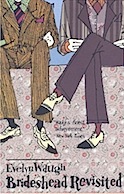 I enjoyed Brideshead Revisited sooooo much more than I thought I would. In fact, I think it’s one of my favorite books ever. Evelyn Waugh has a lot in common with Fitzgerald and Hemingway, though it was published twenty years after The Great Gatsby and The Sun Also Rises. Brideshead Revisited is about wealthy English families between the World Wars. In college, Charles Ryder befriends Sebastian Flyte, and they run around together. Then Charles becomes involved in Sebastian’s family, and due to a flaw, of sorts, in Sebastian’s character, bad things begin to happen, and they part ways. But Charles can’t shake the Flyte family, and we hear about what happens to them through the rest of the novel while Sebastian remains on the periphery. It’s really depressing, though not in the family-loses-its-money-etc-etc way that you might expect. The characters are empty and remain so. No one is happy for long.
I enjoyed Brideshead Revisited sooooo much more than I thought I would. In fact, I think it’s one of my favorite books ever. Evelyn Waugh has a lot in common with Fitzgerald and Hemingway, though it was published twenty years after The Great Gatsby and The Sun Also Rises. Brideshead Revisited is about wealthy English families between the World Wars. In college, Charles Ryder befriends Sebastian Flyte, and they run around together. Then Charles becomes involved in Sebastian’s family, and due to a flaw, of sorts, in Sebastian’s character, bad things begin to happen, and they part ways. But Charles can’t shake the Flyte family, and we hear about what happens to them through the rest of the novel while Sebastian remains on the periphery. It’s really depressing, though not in the family-loses-its-money-etc-etc way that you might expect. The characters are empty and remain so. No one is happy for long.
Dismal.
Though, again, it’s up there with my favorite novels. I spent a long time reading this one because I didn’t want to leave it. I liked the atmosphere. At the end, I found myself in a daze like I did with For Whom the Bell Tolls, when I felt like I was in the mountains of Spain during their Civil War for a few hours after.
Before this novel, I didn’t know much about Waugh, and I guess I still don’t. I most clearly associate him with my chronic confusion over his gender: I’ve embarrassed myself several times calling him “she”. In my defense, though, Evelyn is a pretty girly name. I also don’t understand why he’s not taught in universities. I have an English degree, and I feel like I should have at least heard of him while I was in college. At least for GRE purposes.
I’ll certainly be reading more Waugh in the near future. A Handful of Dust is probably next. It’s funny: sometimes I use a site called The Book Explorer for recommendations, and the list for Brideshead Revisited includes several of my favorite novels. One Hundred Years of Solitude, my Very Favorite Book, is at the top. I wish I’d been introduced to Waugh much earlier.